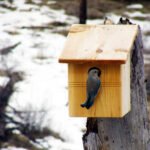 If you’ve been outside recently, you’ve undoubtedly felt the cold chill of winter. While many bird species migrate to warmer temperatures during the winter, there are still many that stick around in the cold.
If you’ve been outside recently, you’ve undoubtedly felt the cold chill of winter. While many bird species migrate to warmer temperatures during the winter, there are still many that stick around in the cold.
Birds are naturally good at surviving, but we can make their lives easier by offering them food that will help sustain them through the harshest temperatures. During winter months, the best types of food to feed birds are those high in calories and fat. Suet is a fantastic food to offer birds in the winter because it is a great source of energy, which helps them fight the cold. If you don’t already have a suet feeder, here’s some more information about it.
What is suet?
Suet is defined as the hard fat around loins and kidneys though it is more commonly viewed as beef fat. Many different types of birds are attracted to suet, including woodpeckers, nuthatches, jays, chickadees, starlings and occasionally wrens, titmice and kinglets. What makes it so amenable to birds is that it is easily digested and gives them extra energy. Suet cakes are hardened blocks of animal fat usually mixed with other ingredients like peanuts, cornmeal and fruits.
Feeders for suet
In order to present suet to birds, it’s a good idea to use a special suet feeder. You can buy some pretty nice suet feeders like this Upside Down Suet Feeder or a traditional cage suet feeder that you can hang from a branch or nail to the trunk of a tree. It’s also possible to make a suet feeder out of a simple mesh bag, but you have to constantly be on the lookout to make sure no birds get trapped in those.
Where to get suet
If you’re short on time or don’t want to make it, you can easily buy pre-made suet at stores or online. Since suet is something that goes bad and can be harmful to birds if not stored correctly, you should make sure to refrigerate any extra suet that you buy from a reputable store. Another option is to make your own suet since beef fat is usually inexpensive at the market. This will be covered more extensively in another post, but all you do is finely grind the beef fat and then heat it until it’s liquified. Next, take pour the liquified fat through a cheesecloth a few times to strain it. Pour it into a mold and let it cool in a refrigerator or freezer. Then put it in your suet feeder.
Suet is a great food to put out in the winter because it helps the birds, but during warmer temperatures, suet turns rancid much quicker so you want to be cautious about not leaving suet to fester. There are summer blends of suet that last in warmer weather however.
If you haven’t begun putting out suet, now is the perfect time of year to get started, so you can attract all those species you’ve always wanted to see.



6 Comments
I use two different kinds one for summer and one for winter.The pine warblers and titmouse love the suet cake in the dinner bell feeder during thls time of the year. Squirrels love suet too so it get to be quite a challange keeping them out
.
I have used this recipe for years-I spread it on trees and suet feeders:
2 cups lard
1 cup peanut butter-cream together
3 cups flour ( sub quick oats for one cup is good)
4 cups corn meal-blend into the lard and p-nut butter until mixed completely-this is spreadable-you can add more meal or flour or both to make crumbles-add dry fruit or chick starter in heavy cold-this helps to avoid gout in the birds, esp. Blue Birds-see ref in Bird Watchers Digest magazine or web site. My recipe comes from one of their issues from the 1980’s. I cannot tell you how much joy this has brought into our yards, and this year a Lifer-Summer Tanager! Our Cardinals and Woodpecker and Flickers and Crows all bring in their babies-amazing stuff!
Our on-line store carries a great selection of suet feeders. Including “going green” which are made of 90% recycled materials! We also have tips on keeping healthy birds in your yard. Keep up the great work! Love reading your information!